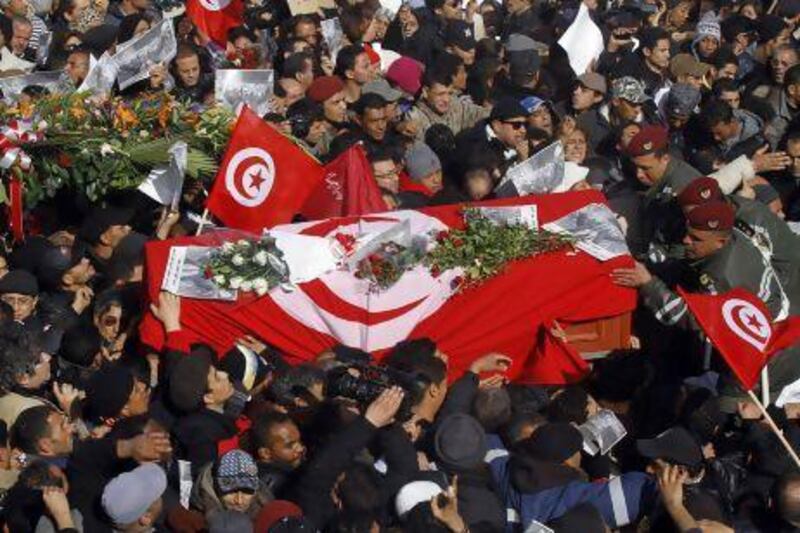TUNIS // Thousands of people converged on the main cemetery of the Tunisian capital yesterday to remember an outspoken opposition figure whose assassination pushed the country deeper into political crisis and prompted the prime minister to promise a change of government.
Hamadi Jebali yesterday reiterated his intention to form a non-partisan technocratic cabinet following the assassination of Chokri Belaid, despite objections from his own Islamist party.
"I insist on my decision to form a technocratic government," he told reporters, saying this would not require the approval of the National Constituent Assembly. "This government is ready."
Mourners in Belaid's cortege, headed by his defiant widow, chanted furious slogans against the Ennahda party of which Mr Jebali is a prominent member. Nearby, gangs of youths torched cars, whose smoke rose up the hill of the Jalaz graveyard as thousands of people sang the national anthem.
In the city centre, police fired tear gas and clashed with youths who chanted anti-government slogans on Habib Bourguiba Avenue.
The interior ministry said 132 people were arrested and estimated the size of the funeral crowd at 40,000.
The crowd at the cemetery was full of bitter disappointment that two years after the uprising that should have changed Tunisia profoundly, the government is dysfunctional, the economy failing, and a slow creeping-up in political violence has taken a sharp new turn with the violent death of Mr Belaid.
"Ghannouchi, the hitman, the assassinator," they chanted, referring to Rachid Ghannouchi, the head of the moderate Islamist Ennahda party which leads an interim governing alliance now gravely threatened. Some people hold the party directly responsible for the death of Belaid, who headed a secular, leftist political grouping.
Others do not go as far as accusing the party of murdering an opponent who posed no serious political threat to them, but say that Ennahda has turned a blind eye to an uptick in violence by people who have some tenets in common with the party's Islamist values.
These include the Leagues for the Protection of the Revolution, self-appointed groups who patrol neighbourhoods and have been involved in clashes with trade unionists. Some also accuse Ennahda of being soft on extremist Islamist groups, such as Ansar Al Sharia, which led an attack on the US Embassy in September but whose leader, known as Abu Iyadh, remains at large.
"This is one of the worst days of my life," said Bouchra Ben Hamida, an activist, who attended the graveside obsequies. While she did not care to guess who was responsible for Belaid's death, she said that it was the duty of the whole government to resign. Crowds of people standing on buildings in the graveyard called out "dégage," the French for "get out", once chanted at former president Zine El Abidine Ben Ali.
The ministry of justice announced yesterday that an immediate investigation was being launched into the killing, to be conducted by a "specialised brigade" of the police.
The mood among the crowd was at once tense and euphoric. As drops of rain began to fall, thousands of voices filled the air with the national anthem. In the streets below, rows of shops were shuttered, markets usually crammed with people were quieted, and all banks and government offices were closed. The powerful national trade union UGTT, which has clashed frequently with the government, had called a general strike in protest at the death of Belaid, and successive attacks on its protests.
International figures have spoken out of their concern for Tunisia, which represented to many, two years ago, a fresh hope that the Arab world could move beyond authoritarianism to peaceful democracy with protected rights and freedoms.
"The assassination of Mr Belaid is tragic, and an attack not only against Mr Belaid and his freedom to speak his opinions freely, but to all Tunisians who have expressed their will to live in a free and democratic society," said former US president Jimmy Carter in a statement yesterday.
Other statements have riled some people and exposed Tunisia's deep fault lines. France's interior minister, Manuel Valls, said on Thursday that France must "support the democrats" in his country's former colony. Mr Valls went on to denounce "Islamic fascism" which he said was on the rise everywhere. This infuriated both moderate and radical Islamic groups.
The hardline Jabhat Al Islah group issued a statement saying "no to foreign intervention". Tunisia does not need the "booby-trapped" advice given by France, it said. Local media reported that the French ambassador had been summoned by Mr Jebali to discuss the statement.
The increasingly tense rhetoric of political figures is gradually eroding hopes that Belaid's death might spark a unified effort to find a way out of the political crisis. Ennahda has publicly disagreed with Mr Jebali on the need to form a national unity government, and the next political steps are unclear.
But some people still hold out hope. Abdelmajid Farrah, 45, lingered at the funeral even as tear gas was deployed. "I came here for the funeral and solidarity," he said. "I think people need to stick together."
afordham@thenational.ae
* With reporting by Radhouane Addala





